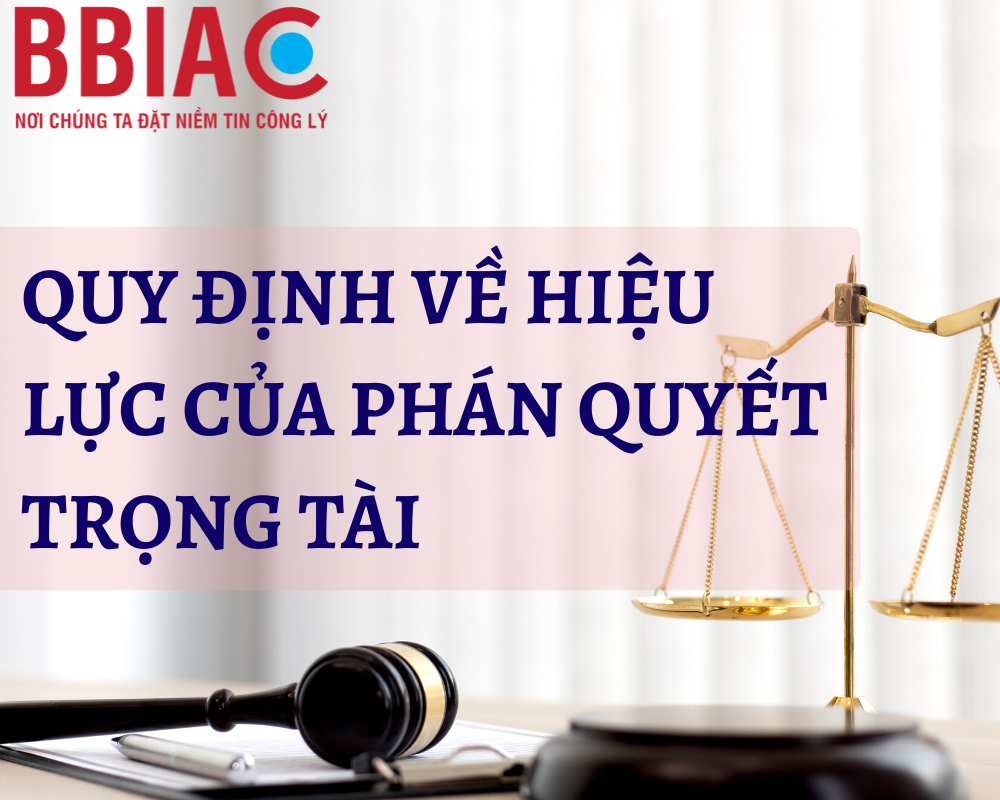Provisions on the Legal Effect of an Arbitral Award

1. The Concept of an Arbitral Award and Its Legal Effect
An arbitral award is not merely a proposal for settlement, but a conclusive and final adjudicative decision. The nature of arbitration proceedings is adjudicative, whereby a third party (the arbitrator or the Arbitral Tribunal) is vested with the authority to determine right and wrong and to render a final decision binding on the disputing parties. This binding effect affirms the authority of arbitration as a dispute resolution mechanism, whose outcome is equivalent to that of a court judgment, notwithstanding that it is not rendered in the name of the State nor does it embody State power.
The legal effect of an arbitral award is clearly defined, marking the conclusion of arbitration proceedings. Specifically, the arbitration proceedings end at the time the Arbitral Tribunal issues the arbitral award, and such award becomes legally effective at that moment (pursuant to Article 3 of the Law on Commercial Arbitration). Commercial arbitral awards in Vietnam possess the following fundamental characteristics:
- The arbitral award is final and binding on the disputing parties.
- The arbitral award constitutes the decision that resolves the dispute in its entirety and terminates the arbitration proceedings of the Arbitral Tribunal.
2. On the Legal Effect and Enforceability of Arbitral Awards
The legal effect of arbitral awards is strongly reinforced at the international level through global legal instruments. The 1958 New York Convention serves as a key source of international law, directly governing the recognition and enforcement of arbitral awards rendered in foreign jurisdictions. The ability of an arbitral award to be recognized and enforced across multiple jurisdictions forms the essential foundation that ensures the high enforceability and reliability of international commercial arbitration.
In Vietnam, the requirements for the enforcement of arbitral awards are provided under Article 66 of the 2010 Law on Commercial Arbitration.
“1. Upon the expiration of the time limit for implementing the arbitral award, if the party obligated to comply with the award fails to voluntarily do so and also does not request the annulment of the arbitral award in accordance with Article 69 of this Law, the party entitled to the enforcement of the arbitral award has the right to submit an application to the competent civil judgment enforcement authority to enforce the arbitral award.
2. With respect to an award rendered by an ad hoc arbitral tribunal, the party entitled to enforcement has the right to submit an application to the competent civil judgment enforcement authority to enforce the arbitral award after the award has been registered in accordance with Article 62 of this Law.”
Furthermore, not only the final arbitral award has binding enforceability. In cases where the parties reach a settlement during the arbitral proceedings, the Arbitral Tribunal will issue a decision recognizing the successful settlement. This decision holds the same validity and enforceability as an arbitral award. This illustrates that the law has expanded the enforceable scope to include voluntary agreements between the parties, provided that such agreements are established under the supervision of the Arbitral Tribunal.
3. Certain Issues Concerning the Nature of Arbitral Awards
Despite their high binding effect, arbitral awards may still be challenged on procedural grounds. The grounds for setting aside an arbitral award are strictly provided under Article 68 of the Law on Commercial Arbitration. This mechanism serves as a safeguard to ensure fairness and legality in arbitral proceedings.
However, the scope for challenging an award becomes absolutely closed once the award has been enforced. If an arbitral award has already been executed, the parties are no longer entitled to prove errors in the award or initiate procedures to negate its outcome. This principle preserves the stability and finality of the arbitral decision.
A notable weakness within the current legal framework concerns the issue of liability. In cases where an arbitral award is set aside due to the fault of the arbitrator(s), Vietnamese law has not yet established a specific mechanism to assign responsibility to the Arbitral Tribunal or the arbitrators. The absence of a clear compensation or liability regime in situations where the award is annulled due to subjective fault represents a legal gap that needs to be addressed in order to enhance the quality and credibility of arbitral awards.
4. Mechanisms for Resolving Disputes through the Bigboss International Arbitration Center (BBIAC)
To resolve a dispute through commercial arbitration at BBIAC, clients may insert one of the following two clauses into their contracts:
4.1. Model Arbitration Clause
“Any dispute arising out of or in connection with this contract shall be settled by arbitration at the BIGBOSS International Commercial Arbitration Center (BBIAC) in accordance with the Arbitration Rules of Procedure of this Center.”
Additionally, the parties may supplement the clause with:
(a) The number of arbitrators shall be [one or three].
(b) The seat of arbitration shall be [city and/or country].
(c) The governing law of the contract shall be [ ].*
(d) The language of the arbitration shall be [ ].**
Notes:
* Applicable only to disputes involving a foreign element.
** Applicable only to disputes involving a foreign element or disputes where at least one party is an enterprise with foreign invested capital.
4.2. Model Arbitration Clause Applicable to Expedited Procedure
“Any dispute arising out of or in connection with this contract shall be settled by arbitration at the BIGBOSS International Commercial Arbitration Center (BBIAC) in accordance with the Arbitration Rules of Procedure of this Center. The Parties agree that the arbitration proceedings shall be conducted under the Expedited Procedure stipulated in Article 37 of the BBIAC Arbitration Rules of Procedure.”
Additionally, the parties may supplement the clause with:
(a) The seat of arbitration shall be [city and/or country].
(b) The governing law of the contract shall be [ ].*
(c) The language of the arbitration shall be [ ].**
Notes:
* Applicable only to disputes involving a foreign element.
** Applicable only to disputes involving a foreign element or disputes where at least one party is an enterprise with foreign invested capital.
Contact 0979 133 955 for consultation!
